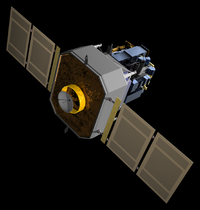
Photo from wikipedia
Abstract Since 2003 the Planetary Virtual Observatory and Laboratory (PVOL) has been storing and serving publicly through its web site a large database of amateur observations of the Giant Planets… Click to show full abstract
Abstract Since 2003 the Planetary Virtual Observatory and Laboratory (PVOL) has been storing and serving publicly through its web site a large database of amateur observations of the Giant Planets (Hueso et al., 2010a). These images are used for scientific research of the atmospheric dynamics and cloud structure on these planets and constitute a powerful resource to address time variable phenomena in their atmospheres. Advances over the last decade in observation techniques, and a wider recognition by professional astronomers of the quality of amateur observations, have resulted in the need to upgrade this database. We here present major advances in the PVOL database, which has evolved into a full virtual planetary observatory encompassing also observations of Mercury, Venus, Mars, the Moon and the Galilean satellites. Besides the new objects, the images can be tagged and the database allows simple and complex searches over the data. The new web service: PVOL2 is available online in http://pvol2.ehu.eus/ , contains a fully functional search engine and constitutes one of the many services included in VESPA (Virtual European Solar and Planetary Access). Data from PVOL2 can also be served from the VESPA portal using the EPN-TAP protocol. PVOL2 also provides long-term storage for amateur observations containing about 30,000 amateur images starting in the year 2000. Current and past observations from the amateur community provide a global view of the Solar System planets over the years with several possibilities for scientific analysis and amateur astronomers involvement in planetary science.
Journal Title: Planetary and Space Science
Year Published: 2018
Link to full text (if available)
Share on Social Media: Sign Up to like & get
recommendations!